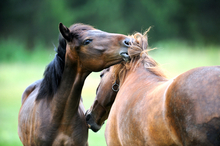A highly contagious disease that has the potential to kill horses has broken out in the Australian Capital Territory and parts of southern New South Wales.

Dangers of highly contagious horse disease - Strangles
Strangles, a highly contagious horse disease caused by Streptococcus equi has broken out in the Australian Capital Territory and parts of southern New South Wales.
Strangles is a bacterial disease that causes nasal discharge and swelling of the lymph nodes around the animal's neck and head, which, in extreme cases, restricts breathing.
ACT senior veterinary officer, Dr Will Andrew, says the five outbreaks so far have been among recreational horses.
"It's serious only if it gets out of control, because you always have an odd case of strangles going along in the horse population," he said.
According to AAEP, strangles is caused by Streptococcus equi, commonly affects young horses including weanlings and yearlings, but horses of any age can be infected.
Vaccination against S. equi is recommended on premises where strangles is a persistent endemic problem or for horses that are expected to be at high risk of exposure. Following natural infection, a carrier state of variable duration may develop and intermittent shedding may occur. The influence of vaccination on intermittent shedding of S. equi has not been adequately studied.
The organism is transmitted by direct contact with infected horses or sub-clinical shedders, or indirectly by contact with: water troughs, hoses, feed bunks, pastures, stalls, trailers, tack, grooming equipment, nose wipe cloths or sponges, attendants’ hands and clothing, or insects contaminated with nasal discharge or pus draining from lymph nodes of infected horses.
Streptococcus equi has demonstrated environmental survivability particularly in water sources and when protected from exposure to direct sunlight and disinfectants, and can be a source of infection for new additions to the herd.
Read more about Symptoms and Prevention of Strangle
